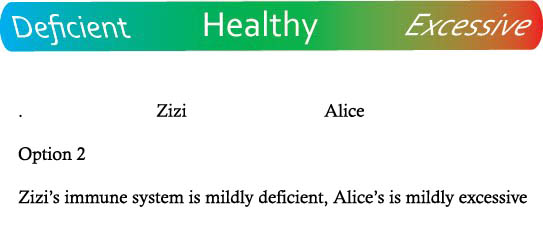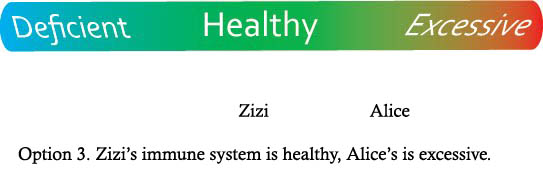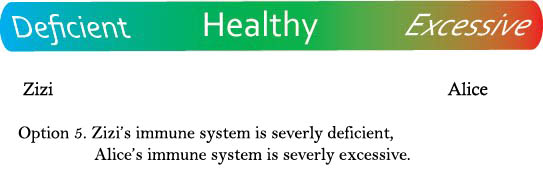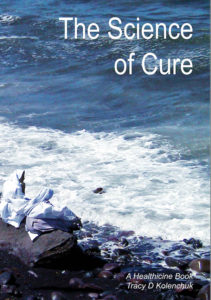In part 1 we met Alice and Zizi. Alice and Zizi are two women, between 30 and 40 years old, of similar height and weight, although Alice is a bit taller and Zizi a bit heavier. Neither Alice nor Zizi has any health problems – they are both normal and healthy.
The question posed: Who is healthier, Alice – or Zizi. But with no other information – and no experts on healthiness (as opposed to experts on illness) – we cannot even guess who is healthier.
In part 2, the common cold, we learnt that:
Zizi – has one to three colds, every couple of years. Her colds typically last 3 days or less.
Alice has 3 to 5 colds every year. When Alice gets a cold – it typically lasts 7 days (a week if she takes cold medicine).
Your first instinct, from a medical view, is to say that Zizi is healthier than Alice. I made this assumption in earlier posts on this topic. But there are many complexities when we take a ‘healthicine view’. Clearly, Alice is sick more often, therefore Zizi is sick less often. But is ‘sick’ the same as ‘not healthy’? No. The opposite of illness is ‘wellness’, not healthiness.
Healthiness is a measure of some aspect of health. Illness arises when healthiness is severely out of balance, as in this image:
How can we measure the healthiness of Zizi and of Alice? Is Alice sick more often than Zizi because her immune system, for example, is deficient? It’s natural to guess that Alice has a deficient immune system – and that’s why she gets more colds and why they are more severe. That makes sense. Doesn’t it?
BUT! The book “Achoo! The Uncommon Life of Your Common Cold”, by Jennifer Ackerman, says that “Overactive immune response causes colds, not the virus itself.” So Alice has more colds because she has an excessive immune system? Or does Zizi have fewer colds because her immune system is deficient? Just what does make sense anyway?
This is so confusing. If we measure the health of the immune systems of Alice and Zizi, we might get several different results.
Is Alice healthier? If Zizi’s immune system is deficient, that might explain why she gets fewer colds and less severe symptoms. Alice, on the other hand, might have a very healthy immune system – which reacts to the cold virus more frequently and strongly. Or perhaps:
Are they both a bit unhealthy? Maybe Zizi’s immune system is slightly deficient, and as a result she gets fewer colds and they symptoms are less severe. Alice, on the other hand, has a mildly overactive immune system, resulting in more frequent – more severe colds. Or perhaps:
Is Zizi healthier? Maybe Zizi’s immune system is actually very healthy, but Alice’s is mildly excessive. Or perhaps it’s different:
Is Alice very unhealthy? Perhaps Zizi’s immune system is healthy, and Alice’s is very excessive. There’s one more choice that needs to be considered seriously.
Are they both very unhealthy? Maybe Zizi’s immune system is actually very deficient, and Alice’s immune system is very excessive. As a result, Zizi gets fewer colds than most people – even when she is infected by a cold virus, while Alice reacts more strongly to every cold virus.
Which is most likely? I don’t believe one is ‘more likely’ than any of the other choices. We don’t usually measure healthiness – we measure illness. If Zizi and Alice’s deficiencies and excesses are not severe enough to cause other illness – they will go undetected. As a result, both Zizi and Alice will be seen as having ‘normal health’ by our medical systems.
We have no scientific technique to measure overall healthiness – and none to measure specific healthinesses either. Alice and Zizi might have mildly deficient, or mildly overactive immune systems – and never know. If Alice has a severely overactive immune system – will she know? Will her healthor know? But there are no ‘healthors’. Will her doctor know? How is a mildly overactive immune system detected? What actions might be recommended? Would they help her beat the common cold?
If Zizi has a mildly deficient immune system – would she know? Would she have more colds, more severe colds if she took action to make her immune system stronger?
Healthier – does not necessarily mean stronger, nor more active. It means more balanced.
Should we expect that Zizi’s immune system is more ‘balanced’ than Alice’s immune system?
Maybe… Maybe not.
The purpose of science is not to find the right answers – in science there are often no right answers. The purpose of science is to find the important questions. Science advances as we address the important questions. Science begins to fail when we think we have the right answers. It becomes dogma.
The purpose of medicine, unfortunately, is to find the right answers. Medicine often views illness as a puzzle, where the doctor needs to thread through the clues and find the right answer. That’s not science. Science is about finding the right questions and researching those questions.
We need to study the science of healthicine, not the dogma of medicine.
to your health, tracy









Pingback: Alice and Zizi: A visit to the Dentist Part 1 – Whose Teeth are the Healthiest? | Healthicine